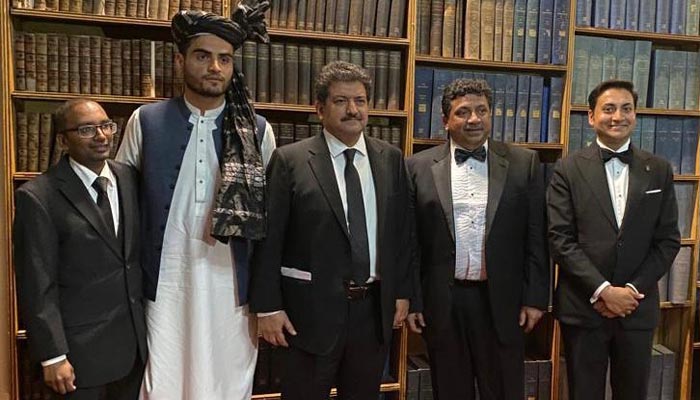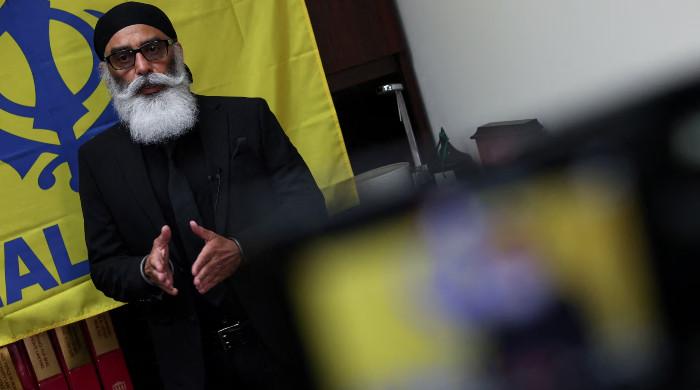Hamid Mir raises voice for detained Kashmiri journalist Fahad Shah at Oxford Union
Hamid Mir says govts in Pakistan, India and Bangladesh are still using some old colonial laws which were imposed by British Raj in 1860
June 03, 2022

Prominent journalist and Geo News anchor Hamid Mir said British Raj still lives on and the voices of political opponents and journalists in South Asia are still being muzzled using the same laws.
These views were expressed by Mir during an event at the Oxford Union — where one of the world’s most prestigious student societies passed a motion after a comprehensive debate that the British Raj lives on even after the 75 years of independence and ruling elites of Pakistan and India are still using old colonial laws to silence the voices of dissent.
Mir spoke on Thursday at the Oxford University’s Blavatnik School of Government on “Press Freedom in South Asia” and he was also one of the panellists at the main debate on ‘This House Believes The Raj Lives On” organised by the Oxford Union Students Society.
The Pakistani journalist made the last speech in support of the motion and Finance Minister of Indian State Tamil Nado Dr Thiaga Rajan was among those who opposed the motion. Other speakers included Jamil Adnan, Ayushi Agarwal, Animal Kejirwal, Pakistani student and Oxford Union member Israr Khan, Rudrangshu Mukherjee and Akhilesh Pillalamarri.
Mir highlighted the name of Pakistani parliamentarian Ali Wazir and Kashmiri journalist Fahad Shah, who are behind the bars and facing sedition charges under section 124A.
Dr Rajan never agreed with Mir and said that British Raj is now dead but after counting the votes in the house the motion was passed that the Raj lives on.
Mir maintained that governments in Pakistan, India and Bangladesh are still using some old colonial laws which were imposed on the subcontinent by the British Raj in 1860. He said that sections 144 and 124A of the criminal procedure code were introduced in 1860 and not removed in the last 75 years. He gave many examples of old colonial laws still operational in the subcontinent.
He said former Pakistani prime minister Imran Khan was booked in many cases under section 144 last week and this section was used by General Dyer in 1919 in Jalianwalla Bagh Amritsar.
Mir said Kashmir’s dispute is also a legacy of the British Raj. He said: “Today Indian government is using old colonial laws to silence the voice of Kashmiris. When I raised my voice against human rights violations in Indian-occupied Kashmir some people in India declared me an agent of Pakistani intelligence and when I raised my voice against enforced disappearances in Pakistan some people called me an agent of Indian intelligence. A colonial mindset still rules the subcontinent."
he further added that censorship in Pakistan and India was introduced by the British Raj. He informed the house that in 2015 the Supreme Court of Pakistan issued directions to adopt Urdu as the official language but even the apex court failed to implement its order and was still writing verdicts in the English language because Pakistani courts practice English law.
Mir emphasised that the supremacy of English in Pakistan is the greatest legacy of the British Raj. He quoted famous poet Faiz Ahmad Faiz in the end who also faced section 124A in 1951 and concluded that until Ali Wazir and Fahad Shah are not released and we don’t break the chains of old colonial laws the British Raj lives on.
Pakistani student Israr Khan from Quetta made history in Oxford Union by delivering a speech in Shalwar Kameez and a Pakhtun turban on his head. The Oxford Union was founded in 1823 and for the first time a South Asian student was allowed to address the house with a turban on his head.









